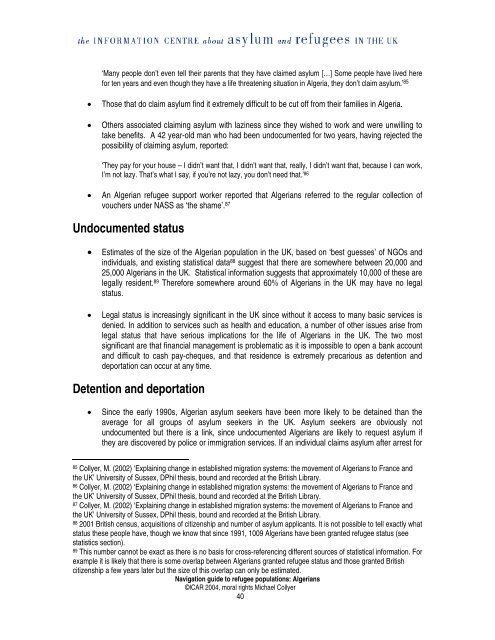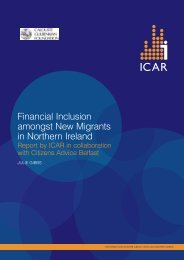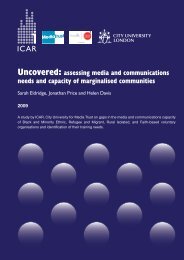Navigation guide Refugee populations in the UK: Algerians - ICAR
Navigation guide Refugee populations in the UK: Algerians - ICAR
Navigation guide Refugee populations in the UK: Algerians - ICAR
Create successful ePaper yourself
Turn your PDF publications into a flip-book with our unique Google optimized e-Paper software.
‘Many people don’t even tell <strong>the</strong>ir parents that <strong>the</strong>y have claimed asylum […] Some people have lived here<br />
for ten years and even though <strong>the</strong>y have a life threaten<strong>in</strong>g situation <strong>in</strong> Algeria, <strong>the</strong>y don’t claim asylum.’ 85<br />
• Those that do claim asylum f<strong>in</strong>d it extremely difficult to be cut off from <strong>the</strong>ir families <strong>in</strong> Algeria.<br />
• O<strong>the</strong>rs associated claim<strong>in</strong>g asylum with laz<strong>in</strong>ess s<strong>in</strong>ce <strong>the</strong>y wished to work and were unwill<strong>in</strong>g to<br />
take benefits. A 42 year-old man who had been undocumented for two years, hav<strong>in</strong>g rejected <strong>the</strong><br />
possibility of claim<strong>in</strong>g asylum, reported:<br />
‘They pay for your house – I didn’t want that, I didn’t want that, really, I didn’t want that, because I can work,<br />
I’m not lazy. That’s what I say, if you’re not lazy, you don’t need that.’ 86<br />
• An Algerian refugee support worker reported that <strong>Algerians</strong> referred to <strong>the</strong> regular collection of<br />
vouchers under NASS as ‘<strong>the</strong> shame’. 87<br />
Undocumented status<br />
• Estimates of <strong>the</strong> size of <strong>the</strong> Algerian population <strong>in</strong> <strong>the</strong> <strong>UK</strong>, based on ‘best guesses’ of NGOs and<br />
<strong>in</strong>dividuals, and exist<strong>in</strong>g statistical data 88 suggest that <strong>the</strong>re are somewhere between 20,000 and<br />
25,000 <strong>Algerians</strong> <strong>in</strong> <strong>the</strong> <strong>UK</strong>. Statistical <strong>in</strong>formation suggests that approximately 10,000 of <strong>the</strong>se are<br />
legally resident. 89 Therefore somewhere around 60% of <strong>Algerians</strong> <strong>in</strong> <strong>the</strong> <strong>UK</strong> may have no legal<br />
status.<br />
• Legal status is <strong>in</strong>creas<strong>in</strong>gly significant <strong>in</strong> <strong>the</strong> <strong>UK</strong> s<strong>in</strong>ce without it access to many basic services is<br />
denied. In addition to services such as health and education, a number of o<strong>the</strong>r issues arise from<br />
legal status that have serious implications for <strong>the</strong> life of <strong>Algerians</strong> <strong>in</strong> <strong>the</strong> <strong>UK</strong>. The two most<br />
significant are that f<strong>in</strong>ancial management is problematic as it is impossible to open a bank account<br />
and difficult to cash pay-cheques, and that residence is extremely precarious as detention and<br />
deportation can occur at any time.<br />
Detention and deportation<br />
• S<strong>in</strong>ce <strong>the</strong> early 1990s, Algerian asylum seekers have been more likely to be deta<strong>in</strong>ed than <strong>the</strong><br />
average for all groups of asylum seekers <strong>in</strong> <strong>the</strong> <strong>UK</strong>. Asylum seekers are obviously not<br />
undocumented but <strong>the</strong>re is a l<strong>in</strong>k, s<strong>in</strong>ce undocumented <strong>Algerians</strong> are likely to request asylum if<br />
<strong>the</strong>y are discovered by police or immigration services. If an <strong>in</strong>dividual claims asylum after arrest for<br />
85 Collyer, M. (2002) ‘Expla<strong>in</strong><strong>in</strong>g change <strong>in</strong> established migration systems: <strong>the</strong> movement of <strong>Algerians</strong> to France and<br />
<strong>the</strong> <strong>UK</strong>’ University of Sussex, DPhil <strong>the</strong>sis, bound and recorded at <strong>the</strong> British Library.<br />
86 Collyer, M. (2002) ‘Expla<strong>in</strong><strong>in</strong>g change <strong>in</strong> established migration systems: <strong>the</strong> movement of <strong>Algerians</strong> to France and<br />
<strong>the</strong> <strong>UK</strong>’ University of Sussex, DPhil <strong>the</strong>sis, bound and recorded at <strong>the</strong> British Library.<br />
87 Collyer, M. (2002) ‘Expla<strong>in</strong><strong>in</strong>g change <strong>in</strong> established migration systems: <strong>the</strong> movement of <strong>Algerians</strong> to France and<br />
<strong>the</strong> <strong>UK</strong>’ University of Sussex, DPhil <strong>the</strong>sis, bound and recorded at <strong>the</strong> British Library.<br />
88 2001 British census, acquisitions of citizenship and number of asylum applicants. It is not possible to tell exactly what<br />
status <strong>the</strong>se people have, though we know that s<strong>in</strong>ce 1991, 1009 <strong>Algerians</strong> have been granted refugee status (see<br />
statistics section).<br />
89 This number cannot be exact as <strong>the</strong>re is no basis for cross-referenc<strong>in</strong>g different sources of statistical <strong>in</strong>formation. For<br />
example it is likely that <strong>the</strong>re is some overlap between <strong>Algerians</strong> granted refugee status and those granted British<br />
citizenship a few years later but <strong>the</strong> size of this overlap can only be estimated.<br />
<strong>Navigation</strong> <strong>guide</strong> to refugee <strong>populations</strong>: <strong>Algerians</strong><br />
©<strong>ICAR</strong> 2004, moral rights Michael Collyer<br />
40

















